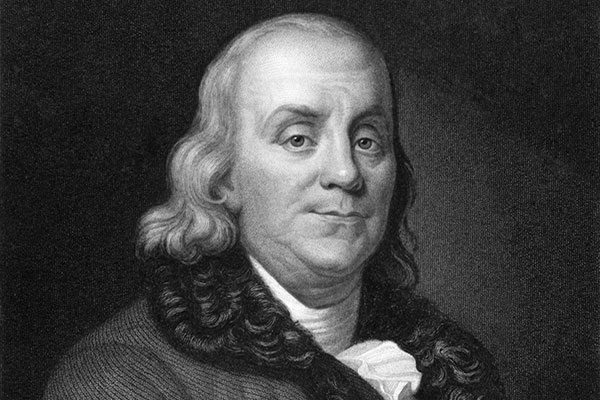“The best thing to give to your enemy is forgiveness; to an opponent, tolerance; to a friend, your heart; to your child, a good example; to a father, deference; to your mother, conduct that will make her proud of you; to yourself, respect; to all men, charity.” ~Benjamin Franklin
When one of the Founding Fathers of America Benjamin Franklin was just 20 (1726), he set out to cultivate his character by practicing 13 virtues, one each week. He created a small book to track his progress with a page for each of the virtues. He made seven columns for each day of the week. At the top of the page, he wrote a “short precept” (see below) of what the virtue meant to him. Every evening he would mark the day with a black spot if he had faultered with that virtue. His goal was to have the day clear of spots telling him that the habit of that virtue had “strengthened and its opposite weakened”.
Franklin believed that through the practice of these virtues, he would become a better man, happier and more successful. He used these virtues in his quest for “moral perfection”, however he admitted that he fell sort many times. In his autobiography, he devoted more pages to this plan than any other point he references in the book. He wrote, “I hope, therefore, that some of my descendants may follow the example and reap the benefit.”
Ben Franklin was an author, inventor, printer, political theorist, postmaster, scientist, musician, civic activist, statesman, and diplomat, an exceedingly accomplished man. His virtues helped him to succeed and are as relevant then as they are today.
1. Temperance
Eat not to Dullness; drink not to elevation.
(Eat and drink in moderation for a healthy and good life.)
2. Silence
Speak not but what may benefit others or yourself; avoid trifling conversation.
(Be mindful of what you say to others. Hurtful words can last and sometimes for a lifetime. Silence is often better than trivial conversation.)
3. Order
Let all your things have their places; let each part of your business have its time.
(Bring order to every area of your life. Attend to each part of your business to succeed.)
4. Resolution
Resolve to perform what you ought; perform without fail what you resolve.
(Commit to the important things. Persevere in spite of obstacles. Honor your word.)
5. Frugality
Make no expense but to do good to others or yourself; i.e., waste nothing.
(Practice economy in life. Avoid wasteful consumption.)
6. Industry
Lose no time; be always employ’d in something useful; cut off all unnecessary actions.
(Become mindful of your priorities in life. Strive not to waste time on what doesn’t matter.)
7. Sincerity
Use no hurtful deceit; think innocently and justly and, if you speak, speak accordingly.
(Be authentic in your communication with others. Say kind and encouraging words to others from the heart.)
8. Justice
Wrong none, by doing injuries, or omitting the benefits that are your duty.
(Follow the rules to keep life simple. Serve others gladly.)
9. Moderation
Avoid Extremes. Forbear resenting Injuries so much as you think they deserve.
(Practice self-restraint in arguments with others. Think before you react.)
10. Cleanliness
Tolerate no uncleanness in body, cloaths, or habitation.
(Cleanliness is a form of self-respect. There is value in neatness.)
11. Tranquility
Be not disturbed at trifles, or at accidents common or unavoidable.
(Be as peaceful as possible in unpleasant situations. Forgive the little things.)
12. Chastity
Rarely use venery but for health or offspring, never to dullness, weakness, or the injury of your own or another’s peace or reputation.
(Remain true to your highest values and respect others.)
13. Humility
Imitate Jesus and Socrates.
(Live a virtuous life.)







Sounds like a wonderful way to live! Everyone should have a notebook like Franklin’s! Unfortunately this world encourages all the vices. I think Ben would be appalled if he could see what this country has become.
Ruth – thank you for your comment. Yes, I agree we should all have a notebook like Franklin’s. The practice of virtues is needed now more than ever, especially the virtue of love.